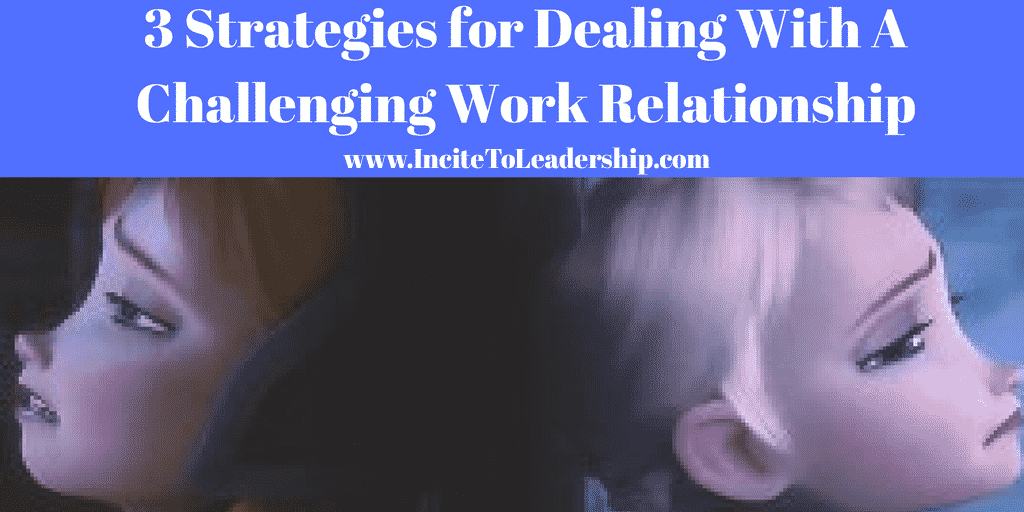3 Strategies for Dealing With A Challenging Work Relationship

I have a 6 year old daughter.
Why am I telling you this? I want you to understand why I’ve seen Frozen multiple times and know the whole soundtrack by heart. I’m really not a Disney princess fanatic, I just. . . . have a 6 year-old daughter.
The other day I had one of the Frozen songs (“Do you want to build a snowman” for those of you in the “know”) stuck in my head. In the song, two characters are sitting on either side of the door – one keeps asking the other to play, while the other constantly refuses. Without going into (slightly absurd) details, neither girl is “bad” or “mean;” one sister is simply lonely and needs a friend while the other one is protecting her sister from harm by staying away.
I’m sure the first sister felt rejected and angry – what had she done to deserve such unfeeling silent treatment? The other sister likely felt tormented, she was trying to do the right thing, why must her sister keep bugging her when she’s made her position clear?
It struck me that this is a variation on a theme I hear from many of my clients who find themselves stuck in a challenging work relationship – they know it’s not working but they don’t know why. “Why is this person at work so mean to me? “ they confide, “I’m trying my best to work with them and create a better relationship.”
In Frozen we can see clearly how two people/two points of view can lead to one BIG challenging and demoralizing situation.
Like the Frozen princesses who inhabit the same castle, working side-by-side, day-after-day with someone who seems pitted against you can turn even the most rational, stoic professional into someone obsessively revising their work interactions and seething.
So what’s a misunderstood Disney Princess to do? – You’ll have to watch Frozen!
What’s a discouraged, misunderstood professional to do? – Keep reading!
3 Strategies for Dealing With A Challenging Work (or Otherwise) Relationship
1. Enlist a Devil’s Advocate
If you’ve ever wondered why people enlist the help of a coach – I can tell you we are awesome at this! You want to find a smart and honest friend and tell him/her exactly what’s happening. Then ask them to poke holes in your strategy and assumptions. Have them point out any possible flaw or omission in what seems to you to be rational and logical conclusions. Blind spots are called that for a reason, it’s incredibly hard to be objective about your own situation – that’s why it might be time to ask for an outside perspective.
(P.S. Work colleagues/friends are generally awful at this since they tend to share your same blind spots – go a little wider afield for this strategy!)
2. Examine THEIR Rationale
Have you ever emailed someone and they didn’t get back to you? You might start to think, “Why are they ignoring me? Did they think my request was too big? Do they not think I’m important enough to answer an email from?” Then, a few days later, you find out that their laptop hard drive crashed and it’s been in Data Recovery for a week. We all have occasional moments where our false assumptions leap out at us.
I had one client who started to see when she was “telling herself the bad story” as we called it. Are you perhaps telling yourself the bad version of your story too?
What are all the behaviors and motivations you are attributing to (and believing are true) about the other person? List them all. Now what are any other reasons it could be true.
If you’re stuck start with these:
- Their marriage is failing
- Their father is dying
- They have no idea their behavior is upsetting you (perhaps they actually think you’re working well together)
More times in my life than I would care to admit, I’ve discovered that what I knew to be absolutely true about a situation, was in fact my own story about the other person. Their motives and beliefs, it often turns out, are often far different from what I attribute to them. (There’s a famous Zen story illustrating this truth – click here to check it out).
 3. Lower the ante
3. Lower the ante
If you’re not getting the result you want, you might find yourself starting to up the ante; deciding to push harder or demand more of someone if what you’ve been doing so far hasn’t worked. Perhaps you even raise your voice? (No I’m sure you’d never do that. . .)
One counter-intuitive strategy is to change the stakes by lowering them.
What if you decided this relationship was not that important – what would you do then? What if you decided you didn’t need his/her feedback on the next deliverable – how would you proceed?
A lot of times the worse a relationship at work gets, the more reasons you find to blame it as cause of things not getting completed or not progressing well. Sometimes removing the importance of that other person from the equation allows your creativity to flow again – allowing you to generate new ideas and solutions that weren’t available when you were too focused on the problematic dynamic.
******************************************************
This is not to imply that I think there are always simple solutions to complex work relationships. The nature of human interactions is that they are inherently multi-faceted and interwoven in many hidden ways.
What I am suggesting in this article, however, is that attempting to widen your perspective of the situation might open up some new insights, and shift your current default behaviors and assumptions.
P.S. I just got off the phone with my good friend, who confided her highly political situation/drama at work. So believe me – I get it! Work politics are hard, and occasionally unavoidable. Sometimes both people aren’t princesses acting from good intentions. Yet the primary fact remains that if you can’t employ some strategies to loosen it’s chokehold on you – the toll on you personally will only continue to grow.
What about you? Comment below and let me know what your best strategy is for addressing challenging workplace relationships?